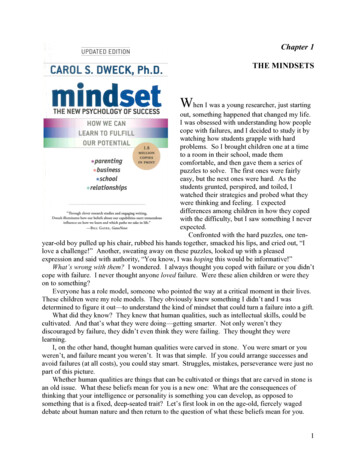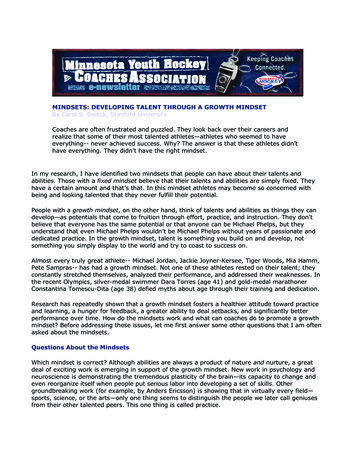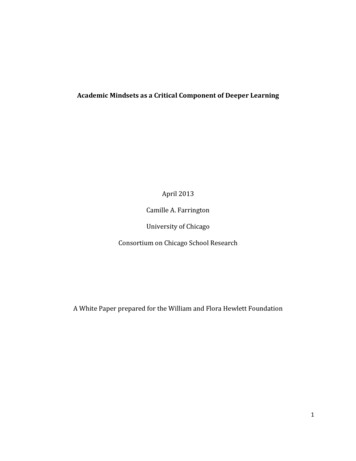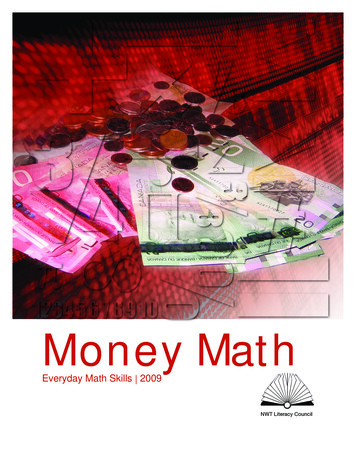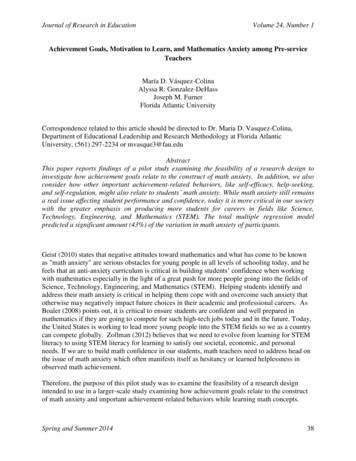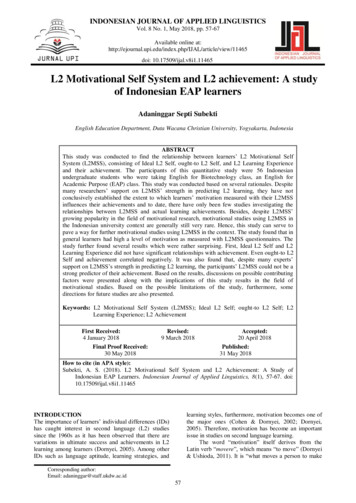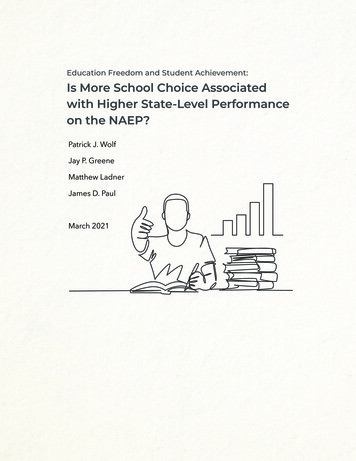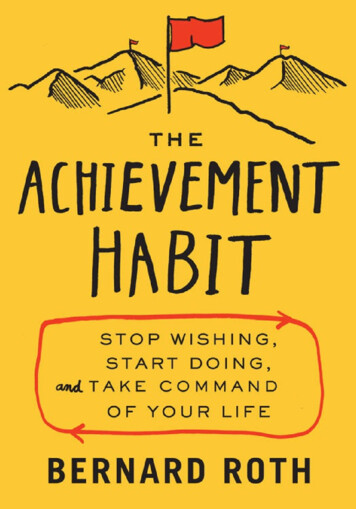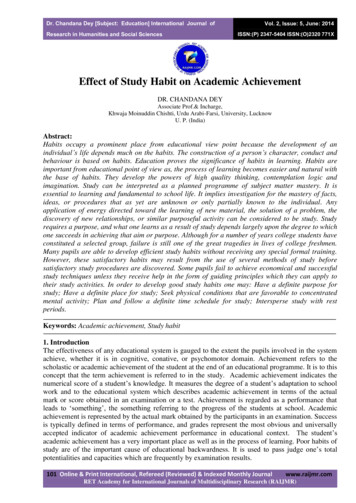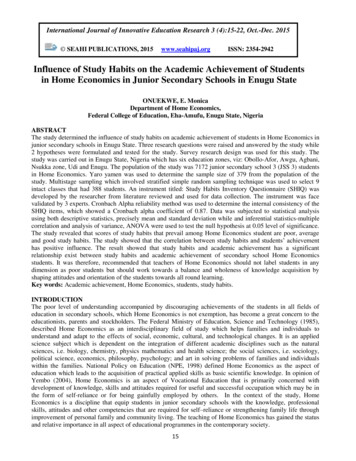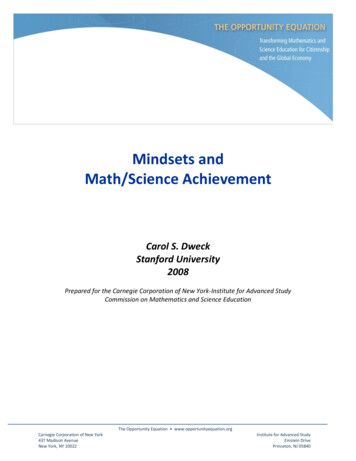
Transcription
Mindsets andMath/Science AchievementCarol S. DweckStanford University2008Prepared for the Carnegie Corporation of New York-Institute for Advanced StudyCommission on Mathematics and Science EducationThe Opportunity Equation www.opportunityequation.orgCarnegie Corporation of New York437 Madison AvenueNew York, NY 10022Institute for Advanced StudyEinstein DrivePrinceton, NJ 05840
There is a growing body of evidence that students’ mindsets play a key role in theirmath and science achievement. Students who believe that intelligence or math and science ability is simply a fixed trait (a fixed mindset) are at a significant disadvantage compared to students who believe that their abilities can be developed (a growth mindset).Moreover, research is showing that these mindsets can play an important role in therelative underachievement of women and minorities in math and science. Below, I willpresent research showing thata) mindsets can predict math/science achievement over time;b) mindsets can contribute to math/science achievement discrepancies for women andminorities;c) interventions that change mindsets can boost achievement and reduce achievementdiscrepancies; andd) educators play a key role in shaping students’ mindsets.MindsetsStudents (and their teachers) can have different beliefs about intellectual abilities.Some believe that intellectual abilities are basically fixed—that people have differentlevels of ability and nothing can change that. In contrast, others believe that intellectualabilities can be cultivated and developed through application and instruction. They donot deny that people may differ in their current skill levels, but they believe that everyone can improve their underlying ability (Dweck, 1999).Students’ mindsets are measured by asking them to agree or disagree on a 6-point scalewith statements such as:You have a certain amount of intelligence, and you can’t really do much to change it(fixed mindset item). No matter who you are, you can significantly change your intelligence level (growth mindset item).Students who consistently agree with the fixed mindset items and disagree with thegrowth mindset ones are classified as holding a fixed mindset (about 40% of students).Those who consistently agree with the growth mindset items and disagree with thefixed mindset ones are classified as holding a growth mindset (about 40%). About 20%of students do not choose consistently and are not classified. (In some analyses, themindset scores are used as a continuous measure and the results are similar.)In studies that specifically examine beliefs about math or science, the questions are tailored to the domain: “You have a certain amount of math intelligence and you cannotreally do much to change it.” Informally, we have noted in our research that studentstend to have more of a fixed view of math skills than of other intellectual skills.2Mindsets and Math/Science Achievement. Carol Dweck.www.opportunityequation.org
Which mindset is correct? Is intelligence fixed or can it be developed? As is wellknown, there has been much debate on this issue through the ages. However, a considerable body of research is emerging from top cognitive psychology and cognitiveneuroscience labs demonstrating that fundamental aspects of intelligence, and evenintelligence itself, can be altered through training. In an extensive study with preschoolers, Diamond, Barnett, Thomas, and Munro (2007) showed that participants’executive control could be substantially increased through a low-cost training regimethat involved giving children experience with tasks involving inhibition of responding.In a study with adults, (Jaeggi, Buschkuehl, Jonides, and Perrig, 2008) participantsgiven training on a demanding working memory task, later scored significantly higheron an unrelated test of fluid intelligence. Fluid intelligence reflects the ability to reason and solve new problems. Moreover, the greater the training, the greater were thegains.In addition, research studying geniuses and/or great creative contributions is yieldingfindings to suggest that talent alone cannot explain these phenomena. Instead theone thing that appears to set those who become geniuses or who make great creativecontributions apart from their other talented peers is the deliberate practice they devote to their field (Ericsson, Charness, Feltovich, & Hoffman, 2006). In other words,genius often appears to be developed over time through focused, extended effort. Aswill be seen, this is precisely the kind of effort fostered by a growth mindset.Mindsets Predict Math and Science AchievementBlackwell, Trzesniewski, and Dweck (2007) followed 373 students across the challenging transition to 7th grade. At the beginning of the year, we assessed their mindsets,along with other motivation-relevant variables, and then monitored their math gradesover the next two years. Students with fixed and growth mindsets had entered 7thgrade with equal prior math achievement, for the impact of mindsets does not typically emerge until students face challenges or setbacks. By the end of the Fall term,the math grades of the two groups had jumped apart and they continued to divergeover the next two years.Mindsets and Math/Science Achievement. Carol Dweck.www.opportunityequation.org3
Our analyses showed that the divergence in math grades was mediated by several keyvariables. First, students with the growth mindset, compared to those with the fixedmindset, were significantly more oriented toward learning goals. Although they caredabout their grades, they cared even more about learning. Second, students with thegrowth mindset showed a far stronger belief in the power of effort. They believed thateffort promoted ability and that was effective regardless of your current level of ability.In contrast, those with the fixed mindset believed that effort was necessary only forthose who lacked ability and was, to boot, likely to be ineffective for them. Finally,those with the growth mindset showed more mastery-oriented reactions to setbacks,being less likely than those with the fixed mindset to denigrate their ability and morelikely to employ positive strategies, such as greater effort and new strategies, ratherthan negative strategies, such as effort withdrawal and cheating.Thus, students’ beliefs about their intelligence played a key role in how they fared inmath across this challenging school transition. When students believe that their intelligence can increase they orient toward doing just that, displaying an emphasis on learning, effort, and persistence in the face of obstacles.Grant and Dweck (2003) examined college students’ achievement as they coped withone of the most challenging and important courses in their curriculum: pre-med organicchemistry, the gateway to the pre-med curriculum. In this study, to address issues in theachievement motivation literature, we focused on students’ goals—how much theywere oriented toward learning goals vs. how much they were concerned with validatingtheir intelligence though their schoolwork. Research has shown that these orientationsare closely aligned with mindsets. Students with the growth mindset tend to orientmore toward learning goals and students with the fixed mindset tend to orient moretoward validating their intelligence (Blackwell, et al., 2007; Hong, Chiu, Dweck, Lin, &Wan, 1999; see also Leggett & Dweck, 1988). I will use continue to use the mindset terminology here for simplicity.In this study, Grant and Dweck found, first, that a growth orientation, compared to afixed ability orientation, predicted higher final grades in the organic chemistry course,controlling for math SAT scores as an index of entering ability. This grade advantage wascaused by the growth-oriented students’ use of deeper learning strategies. Moreover,we found that a fixed mindset predicted students’ failure to recovery from an initialpoor grade, whereas a growth mindset predicted successful recovery. Finally, when welooked further into the data, we found that among students who held a fixed mindset,males outperformed females in final grades; however, among students who held agrowth mindset, females slightly (though not significantly) outperformed males.It should be noted that in these studies and in many of the studies discussed below, students who have a fixed mindset but who are well prepared and do not encounter difficulty can do just fine. However, when they encounter challenges or obstacles they maythen be at a disadvantage.4Mindsets and Math/Science Achievement. Carol Dweck.www.opportunityequation.org
Disparities in Math/Science AchievementThere is increasing evidence that mindsets can play a key role in the underachievementof women and minorities in math and science, as well as their lesser tendency to electto pursue careers in math and science.In two recent experiments, reported in Science (Dar-Nimrod & Heine, 2007), collegefemales, before taking a challenging math task, were given one of two explanations ofthe gender difference in math achievement. One group was told that the gender difference was genetically based (a fixed mindset manipulation), whereas the other groupwas told that the gender difference originated in the different experiences that malesand females have had (more of a growth mindset manipulation). In both experiments,females given the fixed mindset explanation performed significantly worse than thosegiven the growth mindset explanation.Recently, Good, Rattan, and Dweck (2007a) followed several hundred females at anelite university through their calculus course to understand how mindsets influencedtheir sense that they belonged in math, their desire to pursue math courses in the future, and their grades in math. We found that females’ mindsets (and the mindsetsthey perceived others in their class to hold) were an important factor. Females whoheld a growth mindset were less susceptible to the negative effects of stereotypes.Even when they reported that negative stereotypes about women and math werewidespread in their math environment, they continued to feel that they belonged inmath, they intended to pursue math courses in the future, and they continued to earnhigh grades. However, when women held a fixed mindset, negative stereotypes affected them more. Those who reported that negative stereotypes were widespread intheir math environment showed an eroding sense that they belonged in math over thecourse of the semester, and when this happened it was accompanied by a decreasedintention to take math in the future and a decrease in their final grades in the course.Women’s representation in math and science is far lower than their past grades andachievement test scores would warrant. An eroding sense of belonging may be a keyfactor in women’s decision to go elsewhere. Our research shows that a fixed mindsetcontributes to this eroding sense of belonging, whereas a growth mindset protectswomen’s belief that they are full and accepted members of the math community.Aronson (2007), in two as yet unpublished studies, has demonstrated that mindsetscan play a large role in minority students’ underperformance on standardized tests. Inthese studies, Aronson administered the verbal portion of the medical boards (theMCAT) to Black and Latino students who wished to go to medical school. The studentswere given one of two instructions. Half received fixed mindset instructions, in whichthey were told that the test measured a stable underlying ability. The other half weretold that the test measured a set of skills that could be improved with practice. Theperformance of the two groups was highly discrepant, with those who received thegrowth mindset instructions getting significantly more items correct.Negative stereotypes about ability are fixed mindset beliefs. They embody the beliefMindsets and Math/Science Achievement. Carol Dweck.www.opportunityequation.org5
that an ability is fixed and that certain groups do not have it. The more that members of a negativelystereotyped group already hold a fixed mindset, the more susceptible they may be to such a message.The more they hold a growth mindset, the more they may be able to withstand negative messagesabout their ability.Interventions That Change MindsetsTwo studies (Blackwell, et al., 2007, Study 2, and Good, Aronson, & Inzlicht, 2003) created workshopsthat taught 7th graders a growth mindset. In both studies, students were taught that the brain is like amuscle that grows stronger with use, and that every time they stretched themselves and learnedsomething new their brain formed new connections. They were also shown how to apply this lesson totheir schoolwork. In addition, in both studies, students in the control groups received noteworthy information in comparable workshops. For example, in the Blackwell, et al. study, the control group received 8 sessions of useful study skills. Nonetheless, Blackwell et al. showed, the control groups’ gradesin math continued to decline, whereas the grades of the students taught the growth mindset showed aclear rebound.In addition, teachers (blind to whether students were in the control group or the growth mindset(experimental) group, singled out three times as many students in the experimental group as showingmarked changes in their motivation (27% in the experimental group vs. 9% in the control group).6Mindsets and Math/Science Achievement. Carol Dweck.www.opportunityequation.org
In the Good et al. study, the students in the growth mindset group, compared to thosein the control group, showed significantly higher scores on their next math achievement test. In addition, although both girls and boys in the growth mindset groupshowed clear gains compared to the girls and boys in the control group, the girlsshowed even greater gains than the boys and thus decreased the achievement gap.Math Achievement Test Scores Following Growth Mindset Workshop Vs. ControlWorkshopAlthough both of the above stu
Carol S. Dweck Stanford University 2008 Prepared for the Carnegie Corporation of New York-Institute for Advanced Study Commission on Mathematics and Science Education The Opportunity Equation www.opportunityequation.org Carnegie Corporation of New York Institute for Advanced Study 437 Madison Avenue Einstein Drive New York, NY 10022 Princeton, NJ 05840 . There is a growing body
